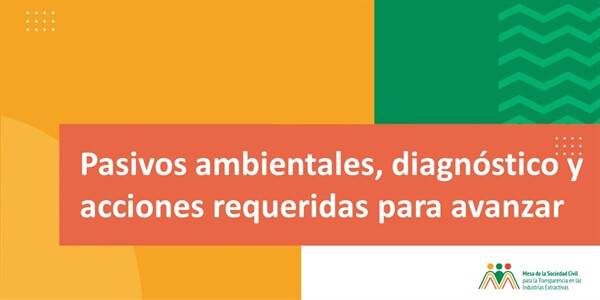The Mesa de la Sociedad Civil para la Transparencia en las Industrias Extractivas presents to the public the diagnosis of environmental liabilities in Colombia developed by the organization Gestión Ambiental Estratégica, within the framework of the activities of the action plan of the Subcommittee on Access to Information on Environmental Issues and Energy Transition, whose purpose is to compile and analyze the available, updated and official information associated with environmental liabilities in Colombia, in order to develop a baseline of the issue and outline a proposal for identification and monitoring of environmental liabilities of extractive industries (mining and hydrocarbons).
One of the issues prioritized by this Subcommittee are the risks caused by environmental liabilities The environmental impacts and externalities that arise from the closure or inadequate abandonment of extractive projects, which produce negative environmental impacts and externalities in the territories where they are traditionally developed, for example: abandoned tailings deposits, contaminated soils and watercourses, abandoned or clogged areas. It is important to draw attention to this issue, since there is no legal definition of the concept of environmental liabilities in the country, nor have criteria, procedures or competencies been defined for their declaration.
The study presents a review of the regulatory frameworks in Colombia and countries in the region to learn about the experiences and management of environmental liabilities. For Colombia, the analysis also included the different development plans that have addressed this issue, as well as the analysis of initiatives in previous and current legislatures: P.L. 117-2021C.
In order to understand the reality of the country and to have updated and real information on environmental liabilities, their location and responsible party, the analysis of the request for information made to the 33 Regional Autonomous Corporations, the Ministry of Mines and Energy, the Ministry of Environment and Sectorial Development, the National Mining Agency -ANM- and the National Hydrocarbons Agency -ANH- is presented. These requests asked for quantification or registration information on the areas considered environmental liabilities in their jurisdictions related to liabilities associated with extractive industries: mining and hydrocarbons.
From the study it can be concluded that there is interest on the part of the Government and the Ministries of Mines and Environment to advance in the conceptualization and management of environmental liabilities, although it is necessary to continue progressing in the legislative framework to achieve advances in the recognition of these areas. The country also has diagnostic information that includes the identification, location and prioritization of environmental liabilities. From the Mesa, we consider of great importance that in this process of recognition of environmental liabilities, the right of access to information is strengthened, channels of accountability are promoted, and citizens are involved in the consultation and agreement on this matter.The communities in the areas of influence are affected by the existence of these liabilities generated within the framework of the operations of the extractive industries. In particular, we hope that these issues can be reviewed and incorporated into the public agenda in light of Bill 117-2021C, where key issues in terms of transparency have not yet been identified.
About the Table
The Civil Society Roundtable for Transparency in the Extractive Industries promotes citizen participation and access to information on environmental issues, with a platform of more than twenty social organizations and academic institutions from different regions of the country, which jointly carry out research, advocacy and citizen control activities on transparency in the extractive sector.

